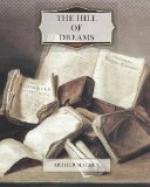For days Lucian lay in a swoon of pleasure, smiling when he was addressed, sauntering happily in the sunlight, hugging recollection warm to his heart. Annie had told him that she was going on a visit to her married sister, and said, with a caress, that he must be patient. He protested against her absence, but she fondled him, whispering her charms in his ear till he gave in and then they said good-bye, Lucian adoring on his knees. The parting was as strange as the meeting, and that night when he laid his work aside, and let himself sink deep into the joys of memory, all the encounter seemed as wonderful and impossible as magic.
“And you really don’t mean to do anything about those rascals?” said his father.
“Rascals? Which rascals? Oh, you mean Beit. I had forgotten all about it. No; I don’t think I shall trouble. They’re not worth powder and shot.”
And he returned to his dream, pacing slowly from the medlar to the quince and back again. It seemed trivial to be interrupted by such questions; he had not even time to think of the book he had recommenced so eagerly, much less of this labor of long ago. He recollected without interest that it cost him many pains, that it was pretty good here and there, and that it had been stolen, and it seemed that there was nothing more to be said on the matter. He wished to think of the darkness in the lane, of the kind voice that spoke to him, of the kind hand that sought his own, as he stumbled on the rough way. So far, it was wonderful. Since he had left school and lost the company of the worthy barbarians who had befriended him there, he had almost lost the sense of kinship with humanity; he had come to dread the human form as men dread the hood of the cobra. To Lucian a man or a woman meant something that stung, that spoke words that rankled, and poisoned his life with scorn. At first such malignity shocked him: he would ponder over words and glances and wonder if he were not mistaken, and he still sought now an then for sympathy. The poor boy had romantic ideas about women; he believed they were merciful and pitiful, very kind to the unlucky and helpless. Men perhaps had to be different; after all, the duty of a man was to get on in the world, or, in plain language, to make money, to be successful; to cheat rather than to be cheated, but always to be successful; and he could understand that one who fell below this high standard must expect to be severely judged by his fellows. For example, there was young Bennett, Miss Spurry’s nephew. Lucian had met him once or twice when he was spending his holidays with Miss Spurry, and the two young fellows compared literary notes together. Bennett showed some beautiful things he had written, over which Lucian had grown both sad and enthusiastic. It was such exquisite magic verse, and so much better than anything he ever hoped to write, that there was a touch of anguish in his congratulations. But when Bennett, after many vain prayers to his aunt, threw up a safe position in the bank, and betook himself to a London garret, Lucian was not surprised at the general verdict.




